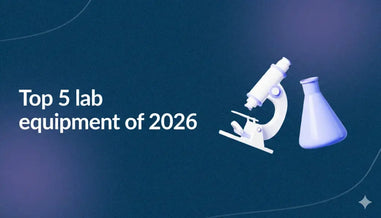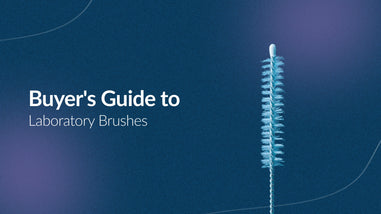- No products in the cart.
Cannabis extraction laboratories are exploding in number and in sophistication in California. New laboratories are clamoring to start their extraction operations rapidly to meet the rising market demands. However, many cannabis companies face the problems commensurate with breaking into an emerging industry
Reliable supply of skilled labor, essential hardware, and basic reagents may be hard to come by. Likewise, newly founded laboratories may be unclear about exactly what resources they need to succeed. As a result, the cannabis extraction startup scene is still trying to find a unified set of production methods and a consensus regarding the best equipment for the job. While the passage of time will mitigate these issues via market forces, the cannabis extraction laboratories of today need to understand which equipment they need to stay profitable in the meantime.
The Fundamentals: Glassware, PPE, and Basic Consumables
Every laboratory requires an ample supply of personal protective equipment (PPE), glassware, and basic laboratory consumables. PPE and general laboratory consumables are the backbone of all activity in the laboratory, even when the main pieces of productive capital are highly automated.
While the rate at which a cannabis extraction company will consume these basic resources will vary depending on their operating protocols, a broad rule of thumb is that laboratories will use one box of disposable gloves per five people working in the lab per week. Likewise, most laboratories will find that it is sufficient to use one disposable laboratory gown per employee per week, which works out to be one standard package of disposable gowns per week for five people.
It’s important not to skimp on PPE to ensure that employees remain safe—but there’s no obligation to overspend, either. For working with cannabis extraction equipment, most labs will find that it is not wise to be paying for PPE that is more protective than the minimum acceptable level of protection.
Similarly, glassware is not a major point of cost savings or high expenditure, and most cannabis extraction labs will find that the standard set of glassware is more than sufficient for their needs. Some new cannabis extraction laboratories may struggle with the idea that glassware is not a permanent productive asset in the way that other equipment may be, however. Glassware is at a high risk of breakage, especially when labs skimp by hiring an outside cleaning service. Incorporating a regular refresh of the lab’s glassware will help to keep unexpected problems at bay.

Extraction Hardware
To extract cannabinoid chemicals from the cannabis flower, having the right extraction hardware is a necessity. The extraction hardware determines the purity of the cannabis concentrate, the efficiency of cannabinoid extraction from the cannabis plant matter, and the cost of starting and maintaining operations. There are three types of cannabis extraction machines:
- Alcohol-based extractors
- Hydrocarbon-based extractors
- CO2-based extractors
Each of these extraction systems has a different cost structure, different reagents, and a specific set of strengths and weaknesses.
- Alcohol extractors are the least efficient in terms of their ratio of extracted cannabinoids to starting biomass and also produce the lowest-purity concentrate, but they’re the cheapest to purchase and the cheapest to operate.
- In contrast, hydrocarbon extractors are expensive to purchase but inexpensive to run on account of their inexpensive reagents and highly efficient extraction. However, hydrocarbon extractors are the most labor-intensive, as the cannabis concentrates which the extractors produce requires extensive purification before being ready for human consumption.
- Finally, CO2 extractors are the most expensive to purchase and the most expensive to operate, but offer the highest extraction efficiency and the lowest level of additional purification after the extraction process.
Thus, if cost were no object, CO2 extractors would be the most effective choice for cannabis extraction laboratories because of its extraction efficiency and minimal post-extraction prep before sale. But, most laboratories need to pay attention to the operating costs of their extraction equipment very carefully, as concentrates are the products which most labs have the largest profit margin with. Running an expensive CO2 extractor could easily run the laboratory’s business into the ground if the extractor doesn’t produce a cannabis concentrate product that can be sold at the right price.
HPLC Systems
All cannabis extraction laboratories need powerful high-performance liquid chromatography (HPLC) systems to test the potency and purity of their concentrates. The legally-required chemical purity and potency analyses of cannabis concentrates nearly exclusively require HPLC to perform. This means that cannabis extraction labs can find cost savings with their selection of HPLC machine, provided that they do not try to purchase an HPLC unit that has features they don’t need.
Many laboratories stumble when picking an HPLC system because they are uncertain about whether their HPLC will be used to help with chemical syntheses or purely as an analytical tool; for cannabis extraction laboratories, this issue is far more clear cut than elsewhere. The vast majority of cannabis extraction companies will be best served by an analysis-only HPLC machine, as all of the reactions necessary to produce cannabis concentrates can be performed with simpler and less expensive methods than HPLC. Analysis-only HPLC machines are less expensive per sample and they typically have a larger sample capacity than mixed-purpose HPLC machines, so the case for purchasing a mixed-purpose machine is very weak.
While many HPLC units are up to the task of performing analysis on cannabis concentrate samples, new laboratories may not fully appreciate the upkeep required to keep their extremely expensive and very fragile HPLC system in good shape. HPLC systems need to get preventative maintenance frequently from a qualified operator, and they also require the use of specialized reagents like HPLC-grade deionized water, which some laboratories may not natively have on hand.
Working with a qualified supplier can mitigate these issues, however. For laboratories who are trying to get started in the cannabis extraction space, partnering with a supplier who understands their needs and has a strong presence in their native area is immensely beneficial. Rather than stumbling over lack of critical reagents or supplies, laboratories which forge a strong relationship with the right supplier will find that their costs are lower and their profit margins are higher as a result of purchasing agreements and inventory stocking practices that work in their favor.
For over 40 years, Lab Pro has been committed to providing equipment and reagents for companies which test consumer products in California and worldwide. Come visit the biggest Lab Supply showroom in California, or contact us online or at 888-452-2776.












































